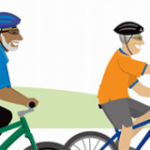Category Archives: Health
Facial Cleanser Options
Is the soap you use for your face the same one you use for your body? If so, you probably don’t realize that the sensitive skin on your face needs a milder cleanser. All Cleansers Are Not the Same While there are different tools for face washing, most people use some type of soap. Even though some facial and body Read More
Hiking How-To: Dress for the Trails
Get ready for adventure! Travel off the beaten path in trailblazing style. Share via facebook dialog ① Grippy rubber outsoles can handle rugged terrain. Adidas Terrex Swift R GTX, $160; REI.com ② A side zipper pocket safely stows your phone. Northway Henley, $40; REI.com ③ Stay hydrated: Insulation keeps beverages cold for 24 hours, hot for 12. Vacuum-insulated bottle, $30; Read More
ADAY Makes Clothes That’ll Help You Keep Your New Year’s Resolution
If you’re one of the many people whose New Year’s resolution is to get in shape, then you’re probably in the market for some workout gear that’ll motivate you to go to the gym. In which case, you’ll want to know about a new activewear company that is going to help you do just that. Meet ADAY, a London-based brand founded Read More
The Evolution Of Workout Clothes Shows How Far We’ve Come Since 1910
As functionless as it sounds, this was the going exercise garb in the early 1900s, way before spandex and wicking fabrics were the norm. And while the first sneakers were invented in the 1800s, they didn’t truly trickle into the mainstream until the 1930s, after World War I, when the importance of fitness began to be emphasized. We’ve come a Read More
Are You Allergic to Exercise?
At first, Nancy Clanton thought it was nerves. Or maybe it was the oranges? Whatever the culprit of the bright red welts covering her body after running in a track meet, Clanton – then a junior high student in Long Beach, California – hoped the reaction was a fluke. It wasn’t. The itchy, clustered bumps continued to sprout up regularly Read More
CrossFit’s Founder Seeks to Sour Government’s Soda Stance
CrossFit Inc.’s founder and CEO Greg Glassman has a message for Washington lawmakers: Get soda out of medical research. Propelled by recent evidence that the sugar industry once influenced nutrition guidelines and by apparent ties between Coca-Cola and a Centers for Disease Control and Prevention official, Glassman spoke on Capitol Hill Tuesday about how Congress should work to keep soda Read More
6 Little-Known Reasons for Eating (Good) Carbs
In order to perform your best as a runner, you need to eat the right kinds of carbohydrates at the right times. That’s because carbohydrates are the major precursor of muscle glycogen, one of the major sources of “fuel” for running. However, this does not tell the whole glycogen story. Glycogen’s role in our bodies is much more than just Read More
How Much Does Your Metabolism Really Slow Over the Years?
“My metabolism just isn’t what it used to be.” We’ve all said it before – usually as we lament the fact that if we even thought about eating like we did back in high school, ourbellies would jiggle for a week. But how much does your metabolism really slow over the years? And is it enough to explain why you’re Read More
Find Your Starting Point
We want to help you become more active, get the most from your activities, and do them safely. The key is to know your starting point and build slowly from there. Knowing where you are right now will help you pick activities that are realistic for you so that you can be successful. Think about a typical weekday and weekend Read More
Stay Safe
Almost anyone, at any age, can safely do some kind of exercise and physical activity. You can be active even if you have a long-term condition, like heart disease, diabetes, or arthritis. Staying safe while you exercise is always important, whether you’re just starting a new activity or you haven’t been active for a long time. Be sure to review Read More




